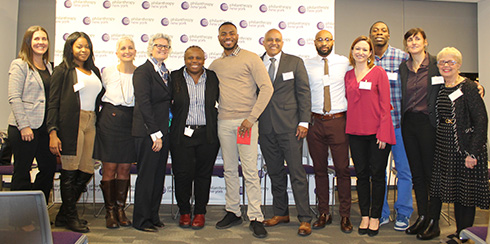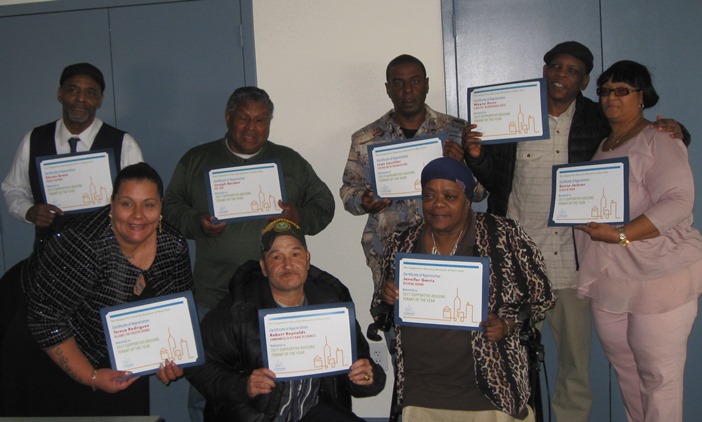

Showing Posts by Date: 12/2017
12.30.2017

Representatives from more than a dozen philanthropies came together on December 12th to hear from providers, young adults, and representatives from city government about the challenges young adults who are transitioning from foster care face in terms of finding and keeping housing. Part two of a series “Helping Foster Youth Succeed,” the panel was organized by the NYC Youth Funders (Katie Napolitano of the Tiger Foundation and Natasha Lifton of New York Community Trust spearheaded the event) and took place at Philanthropy New York. The panel was moderated by the Network’s Executive Director Laura Mascuch, and included Denise Hinds of Good Shepherd Services, Jeremy Kohomban of Children’s Village, Liz Northcutt of City Living NY, Maryanne Schretzman of the Director of NYC Center for Innovation through Data Intelligence, and Judi Trotter of the Administration for Children’s Services, as well as three former foster youth -- Hasani Callwood, Jahlika Hamilton, and Maurice Reid.
Katie Napolitano introduced the panelists, and Maryanne Schretzman framed the panel with an overview of the research on foster youth, including the trajectories of transition age youth and the impacts of various systems on housing stability. Liz Northcutt discussed ways City Living NY has worked with youth to navigate the application to and maintenance of affordable housing once young people leave foster care. Judi Trotter discussed the promising practices of ACS: its Housing Academy; a new program that pays for transitioning youth’s expenses while in college; and the requirement that caseworkers help youth apply to both NYCHA and supportive housing as they leave foster care. Jeremy Kohomban showcased programming at The Children’s Village and the demographics and needs of young people in the foster care system.
As always, it was the young adults who were the stars of the afternoon. Hasani Callwood, who had lived at Good Shepherd Services’ Chelsea Foyer and had recently moved to independent housing, spoke about his difficulties adjusting to the rent differentials. At Foyer, he paid a set amount that was put into a savings account for him to use once he left the program; now that he lives in an independent apartment with the help of rental subsidy, his rent is calculated at 30% of his gross income. Both Maurice Reid, formerly with Children’s Village, and Jahlika Hamilton strongly agreed that this rent calculation – and their unpreparedness for the stark impact it had on their ability to maintain housing – had presented major difficulties. While the 30% standard for rent payment is typical across Section 8, NYCHA and supportive housing, these youth were expecting to pay 30% of their take-home pay, not 30% of their before-tax gross income. When incomes are low, the difference between those two calculations can be large and have serious implications on a household budget. Maurice told of Children’s Village’s advocacy on his behalf when he was turned down for public housing, a fight that took three years to resolve. Jahlika had everyone in tears when she told attendees about the difference City Living had made in her life by painting and decorating her ‘prison grey’ NYCHA apartment one weekend. All three addressed NYCHA’s requirement that applicants choose a borough as part of their housing application, leading some to have to turn down apartments because they were located in neighborhoods the young people were trying to escape.
Natasha Lifton wrapped up the intense conversation by noting that there were some clear policy issues raised that afternoon that philanthropy could address, while Maryann Schretzman noted the same could be said about policies the city controlled.
12.21.2017

Tax reform has now been passed by Congress and signed into law by the president. The Network has been focused primarily on the restoration of tax-exempt, private activity housing bonds (PABs), which were eliminated in the original House proposal. While the final bill will present challenges for supportive housing and its residents, we are happy to say that PABs were restored in the final version of the bill. This is important as PABs play a vital role in affordable housing development in conjunction with 4% as-of-right Low Income Housing Tax Credits (Housing Credits). This capital funding source has become increasingly important to supportive housing development over the past decade, and will be even more crucial to meet New York State’s supportive housing production goal of 1,200 units per year and New York City’s supportive housing production goal of 500 units per year.
For the past two months the Network has been active in gaining commitments from the majority party members to protect PABs and six of nine weighed in to support our cause: Reps. Donovan, Faso, Katko, King, Stefanik, and Zeldin. We thank them for their support.
The 9% Housing Credit is preserved and no additional amendments were added in the final bill. The 130% basis boost remains the same. However, by lowering the corporate tax rate from 35% to 21%, the bill is anticipated to have a negative effect on the value of the Housing Credit – decreasing it by approximately 14% – and projects will require additional capital funding to be made whole. Actions to ameliorate this impact were not included in the final bill, but the Network will be focusing on legislation to address the issue moving forward.
Finally, both Historic Tax Credits and New Markets Tax Credits were retained.
With tax reform behind us, we will focus our advocacy efforts on the budget, fighting to ensure that critical programs to provide affordable housing and end homelessness are not sacrificed. We anticipate that tax reform’s $1.4 trillion in budget shortfalls will trigger automatic spending cuts equal to $146 billion each year for ten years. If automatic cuts do in fact go into effect, there would be reductions across a range of programs including the Department of Housing and Urban Development (HUD) according to the Times.
Here is the full conference bill: http://docs.house.gov/billsthisweek/20171218/CRPT-115HRPT-466.pdf
Relevant news and analysis on the impact on affordable housing can be found on the ACTION Campaign’s website: http://rentalhousingaction.org/.
| Federal12.20.2017

On December 12th, the Network convened a workshop on nonprofit housing development. Twenty-four of our nonprofit members from New York City, Long Island, and downstate participated in the workshop titled: Financing a Tax Credit Deal, presented by Amy Larovere, President of A. Larovere Consulting, and Network Board member Oliver Chase, Partner at Hirschen Singer & Epstein LLP. Attendees learned about available financing options, the basics of Low Income Housing Tax Credit development, and the costs, risks and rewards of tax credit projects.
Participants, including both nonprofits testing the waters of development and nonprofits who have not developed supportive housing recently, gained a deeper comprehension of development financing mechanics and how they should approach structuring a development deal. Presenters emphasized the importance of assembling a strong development team and ensuring the proposed development fits the needs of a community. Participants discussed adapting existing sites to accommodate development and communicating with communities throughout the development process. The Network looks forward to hosting more events as part of our Capacity Building Initiative for nonprofits as we strive to meet the development goals of the Empire State Supportive Housing Initiative (ESSHI) and the NYC 15/15 program.
We are very grateful to CohnReznick for hosting this event in their offices and to our terrific presenters.
|12.11.2017

2017 Network Awards Gala Tenant of the Year Nominees.
Every year, the Network honors remarkable tenants at the Annual Awards Gala for their leadership and growth in supportive housing. Nominations this year were abundant and inspirational, so we decided to bring all tenant nominees together to share their stories, bond with other tenants and staff, and receive honorary certificates as a group. On November 30, supportive housing tenants came together at Fortune Society’s Castle Gardens Residence for a celebratory breakfast. Together, we shared a meal, laughed, and connected across experiences in a truly meaningful gathering. Here are some of the conversations held throughout the event.
After decades of drinking, Joseph Borden (The Doe Fund) announced that he is proud to be sober for almost a year, despite all the challenges thrown his way. Joseph spoke with animation about his appreciation for supportive housing, grateful for how far he has come. He advocated for more scattered site residential groups, and adores and respects his case manager, Yolanda Jones, who was at his side throughout the event.
Wayne Dunn (Lennox Hill Neighborhood House) quit smoking this year with his program’s smoking cessation class! He also works every week to plan, prepare, and serve community meals in his building. He also advocated for and attended Casa Mutua’s Overdose Prevention Training for staff and tenants. He spoke with great enthusiasm for supportive housing, and is known as a strong and kind leader in his community.
Jennifer Garris (Breaking Ground/CUCS) spoke from the heart about the devastating impact of her husband’s death, which led to her battle with alcohol, homelessness, and depression. She loves The Schermerhorn’s Tai Chi and jewelry-making classes, and she makes her way down from the 11th floor of the building every Sunday to cheerfully wish all residents well and check in on her neighbors. “God is not done with me yet,” she explains. Ms. Garris is a true inspiration amongst tenants and staff.
Denise Jackson (Institute for Puerto Rican/Hispanic Elderly) bravely shared the traumatic story of witnessing her mother’s murder, subsequent responsibilities as the family’s “Cinderella,” and eventual drug use and suicide attempts. Today, she is a mother of five, grandmother of 24, and has a great-grandchild on the way. She gives back to her community and has committed to sobriety and wellness in honor of her mother. She is known as one of the most active, beloved, motivating and respected tenants in her building, and had comforting words of support and love for everyone present.
Ivan Lassitier (Federation of Organizations) has shared, “In five years, I see myself living on my own, married, and holding down a good job. You have to stay positive. There are going to be obstacles ahead but you have to get up and dust yourself off. Keep doing the things that are right.” Ivan attends Mosque every Friday and continues to connect with friends and family members. He is grateful for the structure of supportive housing, which has assisted him in the process of living fully to better thrive.
Jamicka Martin (Guidance Center of Westchester) shared her struggles with addiction and poignant reflections on how it impacted her child. She has now graduated with her Associates Degree in Applied Science and Chemical Dependency Counseling, and she is a certified Substance Abuse Counselor. She passionately spoke about how her journey has led her to help others, as her life’s work is to support people struggling to find a power higher than their addiction. Jamicka spoke with confidence and love about her advocacy and her calling to give back.
Tina Miller (Services for the UnderServed) has lived in her residence since 2009, and praised every part of the journey! She proudly stated that she will stay there with her two children until she has saved enough money to buy a house, and she is actively pursuing her nursing degree at Bronx Community College, soon to enroll in Hunter College. A doting mother who has maintained her sobriety, Tina encouraged other tenants at the breakfast to network amongst peers, as that has been her pathway to positive changes in her life and her community.
Robert Reynolds was stationed in the Army years ago in Germany, and he shared the story of his recent return to what used to be the Army base and is now a high school. Robert spoke to the German school’s graduating class! He has reconnected with his daughter in Germany after 32 years, and is eagerly anticipating his next visit to see her and his two grandchildren this spring. Robert entered and left the event smiling from ear to ear.
Teresa Rodriguez (Alliance for Positive Change) spoke openly about her years of drug addiction and the impact it had on her life, including a prison sentence. She is now sober and an advocate for other tenants and her community—she helps new residents get settled in with Housewarming Kits and runs weekly arts-and-crafts groups and movie groups. Teresa’s work has recently been featured in the newspaper and on the local news, discussing the work she does for supportive housing! She connected with other tenants at the breakfast, expressing love, support and hope for others.
Alongside tenants, it was also wonderful to meet the dedicated staff who work with tenants daily and continue to help tenants create new pathways forward in supportive housing. CUCS Case Manager Phylisha Peters-Howard provided information about the innovative emotional healing group she is co-developing with tenants, utilizing relationships and trauma-informed tools to address painful emotional experiences, with an emphasis on tenant-driven curriculum development. Phylisha also spoke at length with Network staff about strategies to address diversity in spirituality and religious faith in tenants’ recovery processes.
Network Executive Director Laura Mascuch addressed the group, thanking them for their strength and leadership, and providing the group with a brief history of supportive housing in New York. It was humbling and inspiring to hear from such amazing tenants and to honor their journeys—the Network will absolutely be holding a tenant breakfast in the years to come.
| Network Events